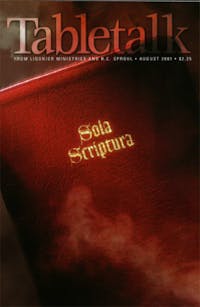
Request your free, three-month trial to Tabletalk magazine. You’ll receive the print issue monthly and gain immediate digital access to decades of archives. This trial is risk-free. No credit card required.
Try Tabletalk NowAlready receive Tabletalk magazine every month?
Verify your email address to gain unlimited access.
King Josiah of Judah (640–609 B.C.) is recognized as one of the most righteous and God-fearing kings in the history of the southern kingdom. One of the things for which he is noted is his thorough and far-reaching reformation that restored true worship in Jerusalem. And among the most interesting features of Josiah’s reformation is what precipitated it.
We are told in 2 Kings 22 that while repairs were being made to the temple, Hilkiah the high priest found “ ‘the Book of the Law in the house of the LORD’ ” (v. 8). When this lost book was brought to the king and read in his presence, “he tore his clothes” (v. 11). The tearing of one’s clothing was a sign of grief and distress. Undoubtedly the reason for Josiah’s distress was his realization that, in the absence of God’s law, the temple leaders had begun to “free-lance” and had introduced or allowed practices that were contrary to the law of God. We are not told how long the Book of the Law had been lost or even whether the temple priests had missed it. But I find it interesting that the book had been lost in the “ ‘house of the LORD.’ ”
I cannot help but recognize a strong parallel between this sad and somewhat ironic situation and the state of the contemporary evangelical church. In many respects, the Word of God has never been more prominent in evangelical churches. Certainly, there is no shortage of Bibles, as many churches have pew Bibles situated next to the hymnals. Furthermore, laymen have a plethora of translations and specialized versions of the Bible available to them. There are women’s, men’s, and youth study Bibles, “Promise” Bibles, “12-Step” Bibles and “Black Heritage” Bibles. If you can think of any subset or special-interest group of Christians, there is probably a version of the Scriptures tailored to it.
However, when one observes what goes on in many churches, as well as the behaviors and thought patterns of many Christians, it becomes evident that in spite of the Bible’s ubiquity, the Word of God has become lost in the house of God and in the homes of Christians. To put it another way, although evangelicals give ready lip service to the doctrine of sola Scriptura, the reality is more akin to “silent Scriptura.” What Protestants have meant historically by sola Scriptura is that God’s Word and God’s Word alone is the only sufficient rule for faith and practice. Inherent in this claim is the understanding that God’s Word is authoritative (binding) and sufficient (it sustains and satisfies the people of God). However, it is precisely on the issue of Scripture being the sole and sufficient source for what we believe and how we live that its silence among evangelicals is most deafening.
As a pastor, I see two very troubling aspects of the Word present yet lost among the people of God. On the one hand, there are those with open Bibles who are oblivious to doctrine. It is as if they believe Scripture repels doctrine. I wish I had a quarter for every time I have heard that familiar evangelical refrain, “I’m not really into doctrine, I’m just into the Bible.” But doesn’t Paul in 2 Timothy 3:16–17 say that one of the purposes of Scripture is for doctrine? So with Bibles galore in our churches, we have seen church discipline jettisoned because it is “harsh” and “judgmental”; worship services designed to cater to felt needs rather than to exalt Christ; stories told in place of sermons; and Christian lives shaped more by Oprah than the Word of God.
On the other hand, there are those who seem to be more concerned about winning arguments and being in the right camp than being true to the Word of God. If the first group is averse to doctrine, this second group has managed to pit doctrine against Scripture—or at least the Christian life as depicted in Scripture. Granted we in the evangelical church are impoverished by our ignorance of the great creeds, confessions, and catechisms of Christendom, but as these rich extrapolations of our faith are rediscovered in our day, it should be remembered that they never were intended to replace the Word of God itself. We cannot allow sound doctrine (or the sound of doctrine) to drown out the voice of God in His Word. God nurtures and strengthens the faith of believers through His Word.
I think it is important for Christians to realize that it is not a case of the Bible instead of doctrine, and neither is it doctrine instead of Scripture. As Paul says, God’s Word “is profitable for doctrine, for reproof, for correction, for instruction in righteousness, that the man of God may be complete, thoroughly equipped for every good work.” It is not enough just to own a Bible or to be in possession of doctrinal truth. God’s Word is to shape our beliefs and how we live.
The voice of Scripture grows fainter and fainter in the evangelical church today. May we repent of this evil and, like Josiah, seek to restore our faith and practice to “Thus says the Lord.”
